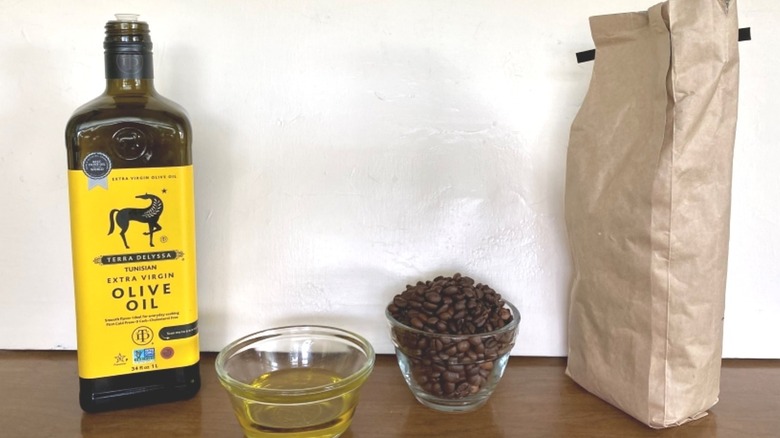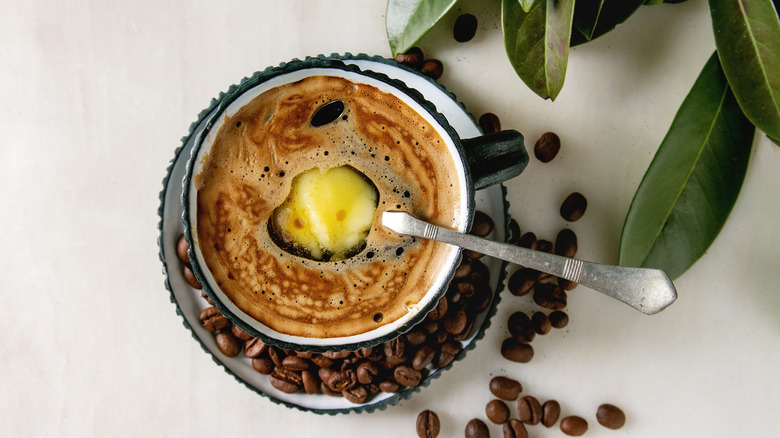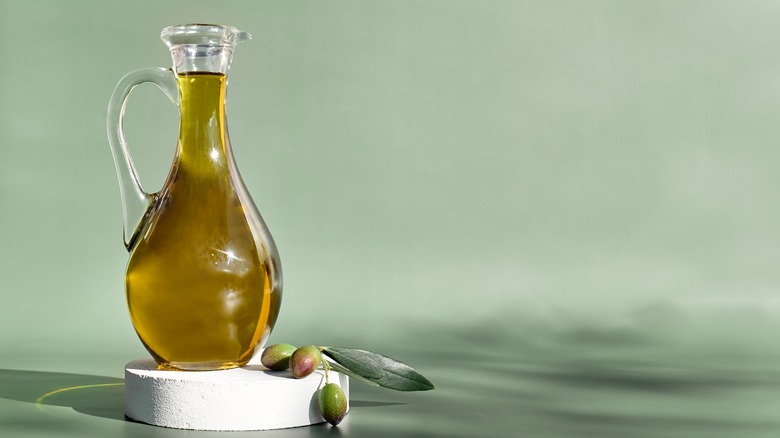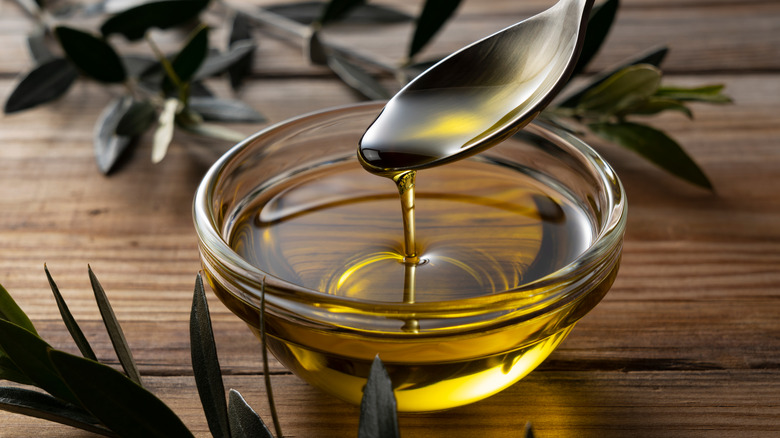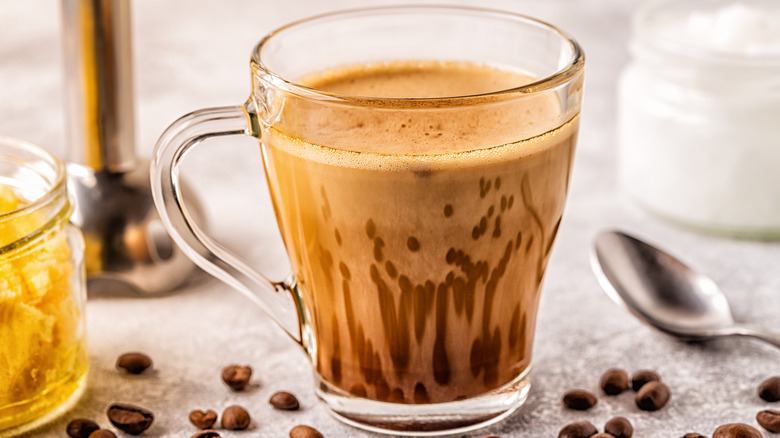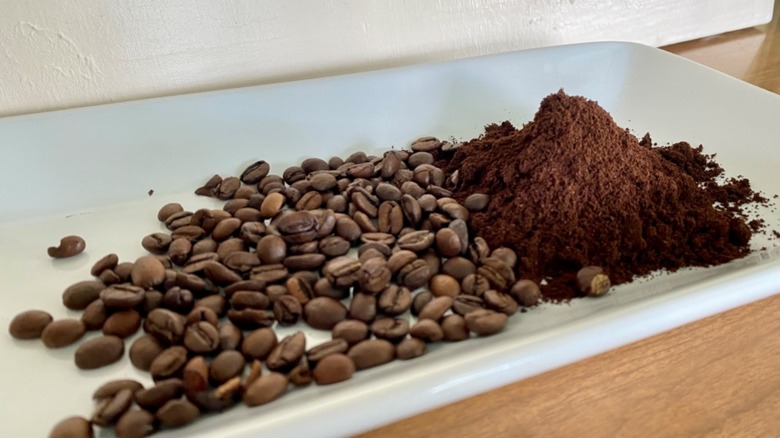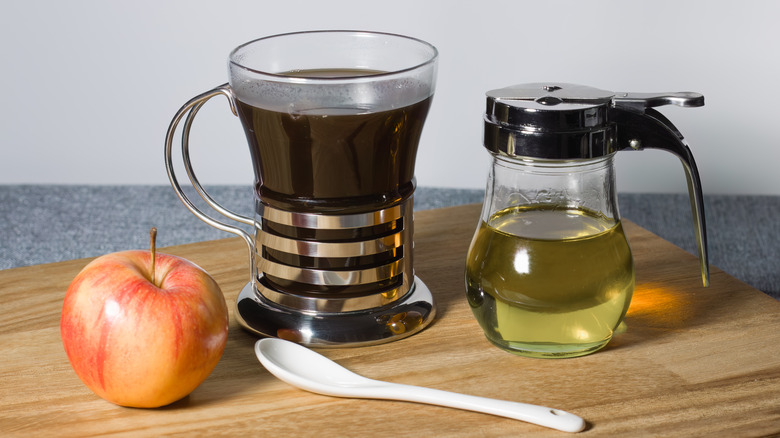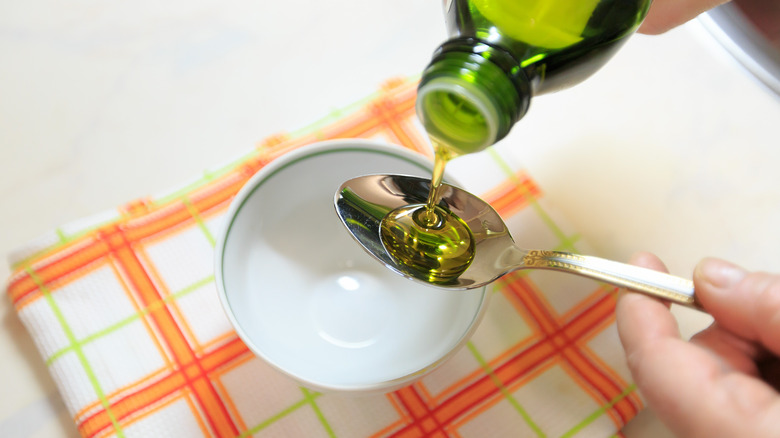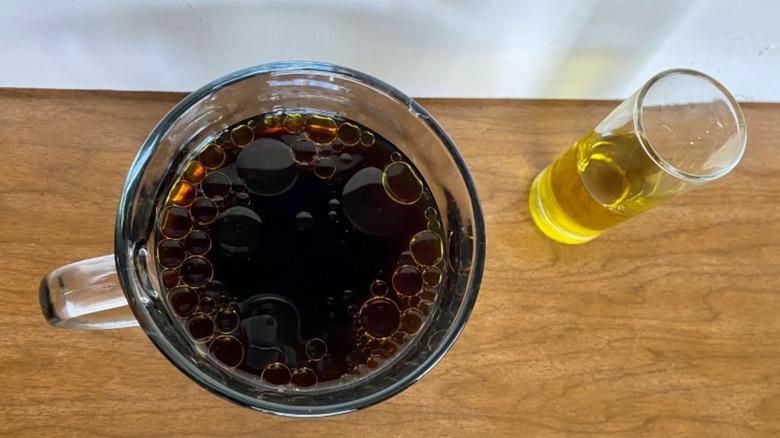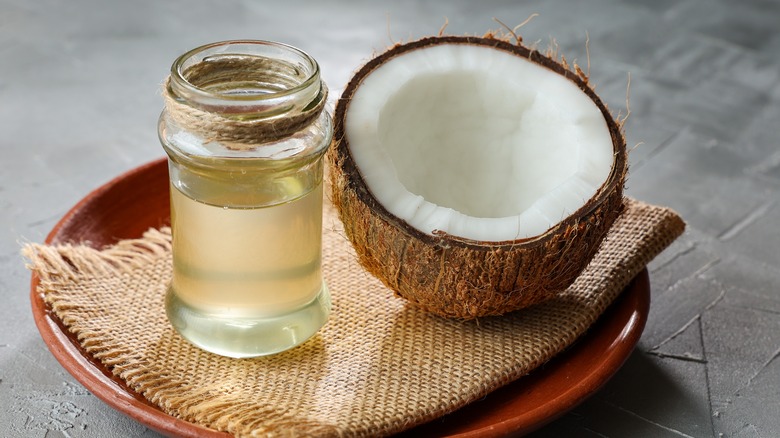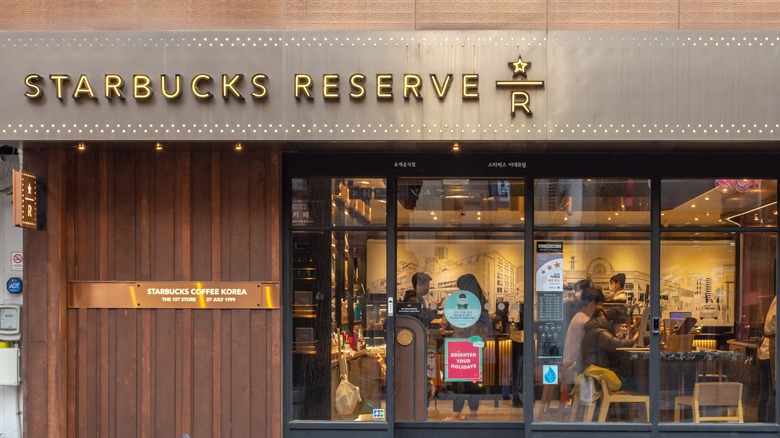Everything You Need To Know About Adding Olive Oil To Coffee
Olive oil in coffee is the star of the beverage world right now, thanks to the new Starbucks Oleato coffee line. This new trend adds a spoonful of olive oil to three signature beverages, the Starbucks Oleato Caffè Latte, the Starbucks Oleato Iced Shaken Espresso, and the Starbucks Oleato Golden Foam Cold Brew (via Starbucks Stories), to tempt consumers into trying the green-tinted espresso. Adding fat to coffee is not a recent phenomenon, but Starbucks iteration was born when former CEO Howard Schultz traveled to Sicily. Schultz claims Italy has long been a source of inspiration for him and the brand, linking Milan's coffee bar scene to his inspiration for Starbucks. When Schultz was in Sicily, he heard about the Mediterranean "family tradition" of drinking a spoonful of olive oil in the morning and envisioned a new coffee ritual to bring to Starbucks aficionados.
For those interested in trying this new version of an old trend, you may have a few questions you want answers to. We spoke to DuWayne Hegel, owner of Urban Bean Coffeehouse Cafe in Orange Park, Florida, about his thoughts on the trend and what the average consumer needs to know about olive oil and coffee before trying it.
Why do people add fat to coffee?
Adding any source of fat into your morning cup of coffee might raise a few eyebrows, but in reality, the practice is relatively normal. If you've ever enjoyed your coffee with full-fat milk or a heavy cream-based cold foam, you've added fat to your coffee. Beyond creamers, mixing additional fat in with your coffee has become a trend itself, as DuWayne Hegel, owner of Orange Park, Florida's Urban Bean Coffeehouse Cafe, reminds us. In the 2010,s "butter coffee" had its moment in the limelight, as celebrities and trainers alike touted it to stay full for longer and give drinkers the energy they needed for intense workouts.
According to butter coffee enthusiasts, the fats in the butter are absorbed by the caffeine in coffee, providing a slower release and keeping one energized for longer and with less energy crash. While its popularity waned, a surge of people eating keto diets is helping butter coffee and oil coffee to gain more traction amongst dieters and those interested in a healthy lifestyle. Olive oil is a recent addition, but in some ways, it makes sense. Olive oil is full of health benefits; in the Mediterranean especially, drinking olive oil is considered a crucial supplement.
Oil in coffee has been around longer than you think
While butter coffee might conjure up images of 2010s-era holistic fitness gurus, adding oil and fat to coffee has been around far longer than the trend suggests. According to baristas interviewed by Perfect Daily Grind, adding butter to coffee has been a cultural mainstay for decades in Singapore. Similarly, tea mixed with yak butter has been a morning treat for centuries in various regions of the Himalayas, where the rich drink is served to workers at high altitudes to warm them up before working in the cold; additionally, villagers often serve the tea to guests ceremonially. As with many cultural traditions, Western capitalism inevitably found a way to commercialize the practice.
After a trip to the Tibetan mountains, a sample of coffee mixed with yak butter led "Bulletproof" founder Dave Asprey to create a signature recipe blend of oils, fats, and java. Bulletproof coffee merges butter or ghee — a clarified butter — and medium-chain triglyceride (MCT) oil into a cup of drip coffee. Other nutrient-packed oils can also be added (which is where we expect the idea of mixing olive oil and coffee comes into play).
Touting various nutritional benefits of adding butter to coffee, Asprey claims the combination is perfect for boosting health and focusing the mind, with the company messaging asserting that adoption of the butter-coffee lifestyle is one of the best ways to sharpen productivity. Naturally, news sources, billionaires, and celebrities swear by it.
Olive oil is considered nutritious
We have long touted olive oil as a nutritional wunderkind, and doctors across the board recommend it as a healthy fat. As such, it's become a preferred food-prep oil over products like corn and vegetable oil, despite having a relatively low smoke point. With that glowing reputation, adding olive oil to everything seems like a no-brainer. What does the nutritional information say, though? According to most nutritional data, olive oil has more monounsaturated fats (the ones that are better for you) than any other plant oil.
Because of this, olive oil can help to lower cholesterol, fight inflammation, and increase the body's absorption of antioxidants. Olive oil contains approximately 120 calories per tablespoon and packs 14 grams of fat. While it does have some saturated fats, the number of healthy fats that olive oil boasts outweighs the 2 grams of saturated fats. That being said, there are a few nutritional differences between standard olive oil and your prized bottle of EVOO. Because the processing used to make standard oil can strip away some nutrients, regular oil will have a lower concentration of antioxidants. With its status of "extra-virgin," EVOO is also cleared of any chemical additives, a rule that standard olive oil doesn't have to maintain.
Further, when consuming food with olive oil, the body can absorb fat-soluble vitamins that are plentiful, like vitamins A, D, E, and K. Olive oil also has strong anti-inflammatory properties and like honey and vinegar, is antibacterial.
But it can have potential health risks
Olive oil might have a beloved reputation as a health food, but moderation is still recommended when consuming it in high quantities — especially as a drink — due to the associated risks. For example, despite the oil's claim to fame as a heart-healthy option, those with heart disease or a history of cardiovascular problems may want to steer clear of mixing it with their coffee. Because it's an addition, not used in cooking, you'll consume more in one serving than you would if you added a tablespoon of olive oil to a batch of stir-fry.
Olive oil is also calorie-rich, which helps you stay full longer if you add it to your morning coffee. Still, per reporting by CBS News, dieticians like Laura Ligos say that those on a strict caloric intake might be better served choosing another option for their cup of joe. Furthermore, adding olive oil to coffee isn't going to eliminate the downsides inherent to the beverage, either. Even though olive oil can help mellow out the acidity of coffee and may soothe upset stomachs caused by drinking coffee on its own, it's still an acerbic drink, which can cause those with GERD or other reflex issues to experience sensitivity or flair-ups.
Certain coffee roasts taste better with olive oil
If you're interested in trying this trend at home, start with coffee. You'll want to pick a coffee you like, but a quality coffee brand will ensure a more uniform cup. Experts state olive oil can soften the strong bitterness and acidity found in coffee, with the molecules of fat in the oil taking the edge off of coffee's flavor. If you want to taste more coffee than olive oil, you'll want to use a dark roast. Darker roasts release the coffee bean's natural oils and caramelize the sugars found in the bean. This leads to intense flavors that vary depending on the region but are commonly rich, chocolaty, and occasionally more bitter.
A lighter roast won't caramelize those sugars completely, and the oils aren't expressed through the heating process, meaning that your blonde roast will be lighter and more acidic, often with citrusy and floral flavors, similar to tea. If you're looking for a flavor to compliment the added olive oil or have a preferred roast level, either roast can be used. If you're worried that sticking to the more extreme ends of the flavor spectrum might make your usual coffee unpleasant, medium roasts are a great option. DuWayne Hegel, the owner of Florida-based Urban Bean Coffeehouse Cafe, further clarifies, saying, "I think the best coffees for any beverage are typically in the medium roast realm, and if you are going to try this trend, make your coffee strong."
Use premium olive oil when drinking it
There's a reason Starbucks has partnered with the luxury olive oil brand Partanna for its line of blended olive oil drinks. If manufacturers process the oil too harshly, they strip many antioxidants and health benefits. The best extra virgin olive oils will taste mellow and rich. These oils have an earthiness that balances out more acidic flavors and, depending on the brand, offer a more bitter, floral, or sweet finish. While there are good quality olive oils that aren't extra virgin, it's worth it to bite the bullet and splurge on the best quality you can get if you're drinking it.
There are four standard types of olive oil: light, regular, virgin, and extra virgin. Light-tasting olive oils have been the most processed and have a higher smoke point. Regular and virgin olive oils are more intense in flavor, but the distinction between them comes with processing. Regular olive oil can be heat-pressed, whereas virgin and extra virgin oil will always be cold-pressed and can be more expensive. While it may seem counterintuitive to price less-processed oils higher, extra virgin olive oil has more good fats and can have an almost fruity flavor. Be careful in your selection; pick an oil with a flavor you might be familiar with from cooking. You don't want the oil to overpower the coffee.
Only add a little bit of oil
If you want to try this trend for its health benefits, it might tempt you to add more olive oil than necessary to your coffee. According to DuWayne Hegel, this is a mistake. You risk changing the taste of your drink from "coffee with olive oil" to "olive oil with coffee," which can be unappealing. Daily health recommendations say you should only consume one to two tablespoons of oil daily. If you intend to cook with it later on, it might be better to use less than more.
Most fans of oil in coffee only recommend a teaspoon or two. If you're looking to follow Bulletproof coffee's recipe, be prepared to add up to a tablespoon of grass-fed butter or ghee along with MCT oil in lesser amounts (via Bulletproof). Heart professionals claim that olive oil's amount of good fats can help lower the risk of heart disease, but few recommend drinking oil in your coffee daily. Because of the added fats and caloric density, any oil should be used in moderation, and some people find that eating or drinking too much oil leaves them feeling nauseous.
How to troubleshoot taste and texture
A common issue found when Starbucks fans tried the new line of Oleato beverages was an "appalling top layer" of oil, an unpleasant texture left when the oil emulsion broke. Because baristas froth the oil into the cold cream topping or blend it into the coffee, oil beads collect and form a film that coats the mouth. If you're making olive oil coffee at home, try working with a smaller amount. Urban Bean Coffeehouse Cafe owner DuWayne Hegel also recommends a handheld frother or whisk, saying, "You would put the coffee in a blender and slowly drizzle the oil into the coffee to emulsify it completely. A handheld battery-operated mini blender will work in a cup if you slowly drip the oil while blending."
The longer you let your beverage sit, the more the emulsion will break. Because it's oil mixing with a water-based drink, you can't create a stable mixture that won't separate. Reviewers of Starbucks Oleato coffee and olive oil recommend drinking quickly and trying hot and iced, as everyone may have different preferences. If your coffee tastes too earthy or bitter, try adding flavors that sweeten your beverage. Nutty additions like almond milk or hazelnut syrup may make the drink more palatable, and the oat milk in the Starbucks line can also be a welcome buffer.
Try coconut oil coffee instead
If the thought of putting olive oil in your coffee is a deal-breaker, but you still want to try the purported health benefits of oil in coffee, a milder alternative could be coconut oil. Coconut comes in both liquid and solid forms and is often at the same price point or cheaper than olive oil. It's naturally sweet and has a much more balanced flavor. Coconut milk is already a popular alternative dairy for coffee shops, so the flavor is less extreme. Beyond its palatable taste, some health professionals claim that drinking coconut oil has health benefits.
Coconut oil naturally contains the same MCT (medium-chain triglycerides) that Bulletproof coffee includes in its recipe, and the presence of these fats works to lower bad cholesterol in the same way on their own. Coconut oil can help support gut health and soothe upset stomachs caused by coffee's acidity. These benefits make coffee easier to drink first thing in the morning. To try this version at home, continue using only a tablespoon or so of oil, and start with less than you think. If you're worried about the taste of pure oil in your coffee, make a delicious coconut latte that combines coconut milk with coconut oil. You can easily adjust the recipe to include more or less oil once you've discovered your preferences.
Where can you find olive oil coffee?
Starbucks launched its Oleato coffee line exclusively in Milan, Italy, but announced plans to bring the beverage stateside in early 2023. As of March 23rd, consumers can find coffee blended with olive oil at Starbucks locations in Chicago, Seattle, and New York at its specialty Reserve Roasteries. On the 27th, other stores started offering the Oleato line in Los Angeles and expanded to Chicago locations beyond the Reserves. You could ask a local coffee shop to make it for you if you're not near a Starbucks Reserve. According to DuWayne Hegel, it's unlikely to be on small cafe menus anytime soon, but if you have a good enough rapport with your barista, many shops are willing to get experimental.
Can't find it anywhere in your area? Try ordering a cold brew or a plain latte from a great coffee shop and making the addition yourself. Hegel highlights coffee's importance in this trend, reminding us that we're drinking coffee for coffee, not as a vessel to hide olive oil. Using good quality coffee from your favorite cafe might give this drink a fighting chance it needs to move beyond its gimmicky status.
Should you try olive oil in your coffee?
While it certainly may help you stay full throughout the day, many professionals have advised against drinking olive oil coffee regularly for your health. Adding excessive amounts of unnecessary oil to your diet can lead to issues with obesity and heart disease, as well as high cholesterol and other problems. The tablespoon of oil used should be more like a teaspoon, according to dieticians. DuWayne Hegel's decision is made solely on taste. "I tried this years ago during the bulletproof trend and again to review my opinion to be able to comment on it. My opinion is this; olive oil is super healthy, full of omega 3s, and should be ingested daily. Coffee is very healthy, full of antioxidants, and should be ingested daily. However, the two should never mix ... Keep that for your salads and stir-fry."
If you still want to try olive oil and coffee, take heart! It's not all bad news. There have been some pretty good press surrounding the new line, with reviewers especially liking the shaken Oleato drinks at Starbucks and offering their tips and insight to make it better.
